'If you invest your entire capital in talks, you cannot abruptly change gear and decide on war.'
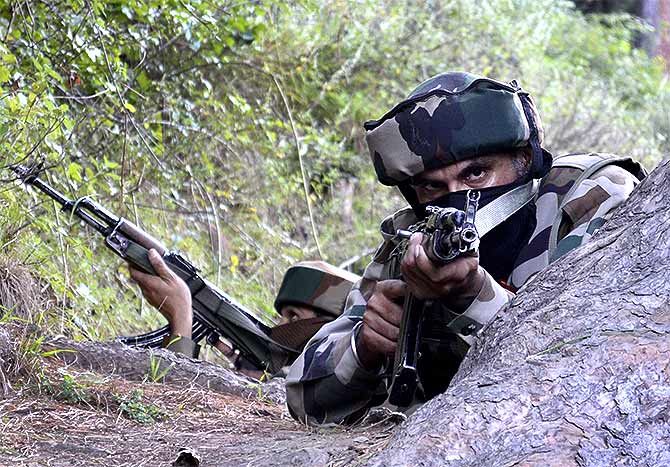
The government and the military's responses after the Uri terror attack, where 18 soldiers lost their lives, have ranged from the forceful (warning punishment and revenge) to the cautious (the army declaring it would strike at a time and in a manner of its choosing).
As the days pass, it is clear that military action may be inadvisable at this time, and a diplomatic isolation of Pakistan would appear a better option.
Rediff.com's Nikhil Lakshman asked strategic thinker Dr Ajai Sahni, Executive Director, Institute for Conflict Management, how he felt India should retaliate.
How do you think India should retaliate after the Uri attack?
Would you recommend a quick surgical strike against terrorist training camps across the Line of Control?
By doing that, would India play into Pakistan's hands at a time when Islamabad is trying to internatlionalise the Kashmir issue?
Revenge is a dish best served cold.
The threats and imprecations that followed the Uri attack have already faded in the face of reality.
The fact is, if you invest your entire capital in talks, you cannot abruptly change gear and decide on war or any other range of graded military options.
Such options have to be developed with a commitment of substantial resources within a clear strategic framework.
We have no such framework and, for decades, have starved our armed forces of the resources necessary to defend India. The policies of the present government have made no radical departures from these past patterns.
Islamabad has been trying to internationalise the Kashmir issue for nearly 70 years now. Just because the matter is going to be raised in the UN once again doesn't make the slightest difference.
These are just storms in the diplomatic and media teacup.
Our tactical responses to this latest provocation are a function of capacity, not of what other people will think.
There is significant consensus among most of the Western powers today that if India could take effective action against Pakistan for its terrorism, it would not attract extraordinary criticism, since the Western powers are also victims of terrorism arising from Pakistan.
The international environment is more hostile to Pakistan today than it has ever been before.
'There are many in America and the West who are waiting for an opportune moment to inflict punishment against this rogue State.'
Western observers fear an Indian military attack across the LoC could invite a nuclear response from Pakistan. Do you think that fear is far-fetched?
Has the threat of nuclear conflict kept India from direct military action so far?
Any nuclear attack by Pakistan would be an act of suicide for that country.
It is curious that we are always speaking of Pakistan's nuclear arsenal, but forget that we have one as well.
I don't see China, for instance, constantly harping on India's nuclear capabilities. India's responses to Pakistan over the decades have been the consequence of policy incoherence and the failure to develop effective capacities for deterrence and coercion over the decades -- the consequence of the stated objective of seeking 'defensive parity' with Pakistan.
This is utterly absurd. Why defensive parity with a country one-eighth our size?
To take the Chinese example again, does Beijing seek 'defensive parity' with India?
Some say there has been an Indian response to Pakistan-led terrorism, only it has been covert and we don't know its dimensions. Is that true?
As someone in the know of things, do you think our covert operations in Pakistan have been effective enough?
All this nonsense of a 'covert' Indian response is again empty boastfulness.
There is a marginal response, of course, in terms of some nominal aid to Baloch dissident exiles in Western countries, but not much more.
Our covert capacities are abysmal, and have been systematically dismantled by successive governments since the late 1970s.
It will take years, if not decades, to reconstruct these capacities, if there is a clear strategy and the necessary and sustained will. Neither of these preconditions exist.
Moreover, the notion of covert responses tends to be fairly rudimentary and often quite juvenile, restricted to tit-for-tat adventurism, and lacking any long term strategic perspective or endgame in view.
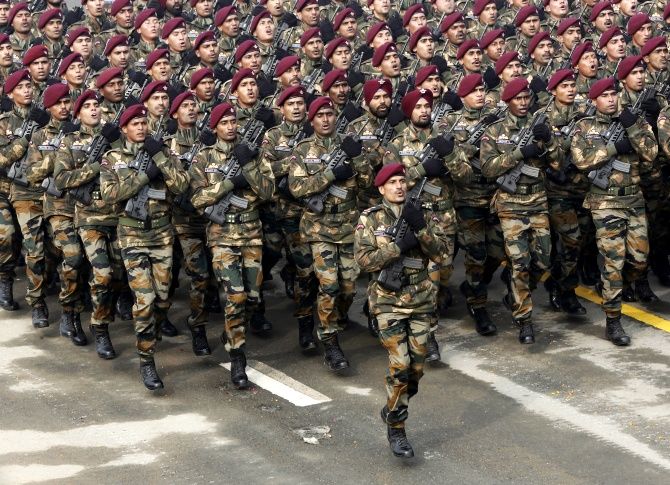
Would you advocate more covert activity -- despite its many challenges -- to overt action that would invite many imponderables from a chance of a nuclear conflict to a war with high casualties?
Our principal responses against Pakistan must, in the near term, be covert.
At the same time, we must develop our military capabilities massively, so that there is complete conventional asymmetry between the two countries, even as Pakistan is forced into an unsustainable competition with India.
The entire security apparatus in India has been enormously starved of resources. Even today, though there are a handful of high value acquisitions on the table, the security forces are being starved for funds for a wide range of operational capacities, including training and the most rudimentary facilities in some forward areas.
The fact that soldiers deployed during 'routine turnover of units' were living in tents and temporary shelters in Uri, one of the most dangerous locations in the long-troubled valley, is only one pointer to the degree to which forces are starved of adequate operational funds.
There are numberless such examples in which operational capacities of the forces are being undermined, even as hypernationalism and belligerence dominates the national political discourse.
How do you explain the escalation of terrorism this year after a seeming lull in recent years?
There has been a slow trend of rising violence in J&K, after fatalities bottomed out at 117 in 2012. Any explanation of this can, at best, be speculative.
The successful street mobilisation of 2008, 2010 and 2016 have perhaps encouraged Pakistan to believe that it can revive domestic terrorism in the state.
Moreover, terrorist violence is feeding into the street mobilisation and violence, and this may be the motive for escalation.
There may also be rising pressure from terrorist formations based in Pakistan, who may feel that, if the state consolidates further in J&K, it may be impossible to recover lost ground.
There may also have been a strategic decision in the (Pakistani) army leadership to escalate violence, though there is no visible or rational explanation as to why this should be so at this particular stage.
In any event, the escalation is not extraordinary, and can be explained by just a few major terrorist successes, including the latest high fatality attack at Uri.
The broad trend, however, remains at a fairly low level of violence, compared to the 1990 to 2006 period, when a high intensity conflict raged in the state.
Given Pakistan's unflagging motivation and the general political mismanagement of J&K by both the Centre and the state government, it is unrealistic to expect a sustained declining trend.
How do you account for the Pakistan military's arrogance in the last 18 months?
In this there is no greater or lesser 'arrogance' on the part of the Pakistan army. It is a confidence born out of the reality that if they could successfully confront the Soviet Union, then one of the world's two superpowers, and thereafter thwart the US in Afghanistan, they can certainly tackle a vacillating and incoherent Indian leadership.
However, Pakistan has been overplaying its hand for over three decades now.
World opinion is increasingly skewed against it, and there are many in America and the West who are waiting for an opportune moment to inflict punishment against this rogue State.
Further, Pakistan's internal circumstances, the rising domestic terrorism, an economy in disarray, political tensions and incoherence, and an army that is much weaker than it has ever been before, are also pushing the country inexorably towards a crisis beyond its means of management.
While China may bail the country out for some time, if the rest of the world works in consonance, Pakistan faces a future similar to North Koreas, as an impotent global pariah.
Such an outcome is, however, years and possibly decades in the future, and Pakistan will continue to do tremendous harm in the region, to India, and to the world in the interim.
It is, consequently, necessary to evaluate and augment the strategic options to deal with the challenge of the Pakistan-backed jihad.
Relationships between States have little to do with friendships -- real or imagined.'
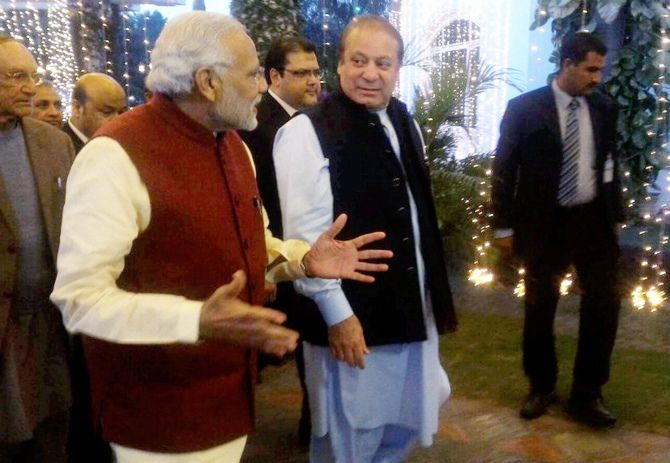
How would you explain the twists and turns in Mr Modi's Pakistan policy?
From Lahore to Uri, what has gone wrong with the prime minister's Pakistan policy?
Prime Minister Modi's 'Pakistan Policy' lost its way even before he was sworn in, when he did a u-turn on his election and post election promises not to engage with Pakistan unless terrorism ended.
He had promised an end to the previous regime's vacillation and desperation to engage with Islamabad and declared that it was impossible to have a conversation over the noise of guns and bombs.
When he invited Prime Minister Nawaz Sharif to his swearing-in ceremony, and thereafter tried to push forward an accelerated 'dialogue' process, including the graceless and personalised initiative of 'dropping in' on Sharif on his birthday, he had reverted to the failed 'default mode' of Indian foreign policy, which has swung like a pendulum between 'talks and no talks', with no other options explored or developed.
In many ways, the present government's approach is even worse that its predecessor's.
By personalising issues, Prime Minister Modi has reduced international relations to the level of a saas bahu drama -- indeed, this has been a feature of much of his foreign policy.
Relationships between States have little to do with friendships -- real or imagined -- between individuals.
To be productive, they must be based on a hard headed calculus of interests of State, and a reality based assessments of mutual capacities and intent.
There is no evidence to suggest that such a calculus or assessment has been made by this government with regard to Pakistan.
As someone who understands the byzantine dynamics of India-Pakistan relations, what are the signs we have missed this past year that things were in free fall?
What must India watch out for in the coming months?
There is a great deal of nonsense written about the complexities of Pakistani politics and the relationship between the civil government and the military.
At the end of all these 'analyses' most experts continue to recommend their own preferred pattern of 'dialogue.' This approach is fundamentally flawed.
While an understanding of Pakistani politics would certainly be an advantage for any Indian government or negotiator, India must deal with Pakistan qua State.
It is the Pakistani State, its declarations and actions, that are relevant to our State policy, not the domestic political arrangements in that country.
If we cannot deal with the State to our advantage, it matters not a whit what such internal relations within the Pakistani power structure are.
In any event, all this twaddle about the fractious relations between the civil and military sides in Pakistan is fairly pedestrian knowledge, and if we haven't been able to factor it into what passes for our foreign policy in 70 years, there is evidently a problem with our thought processes.
Many cheered the prime minister's shout out to the movement for a free Balochistan in his Independence Day speech. Do you think it was what one observer called a 'game changer'?
The sudden stridency on Balochistan and calls for a tit-for-tat strategy against Pakistan are immature and poorly thought out. This is not just a matter of making a few statements.
The Baloch people have long hoped for Indian support -- and have been repeatedly assured of such support in the past. They have been betrayed by New Delhi on each such occasion.
This may just be a question of brave posturing or short-term adventurism for us, but for many Baloch, this is a matter of life and death.
Has the government worked out in any strategic detail what its goals are in Balochistan? And are we making a long-term commitment to this cause, which we will not sacrifice at the first overtures of false friendship that Islamabad may make towards us?
Moreover, have we worked out the consequences of this support in terms of our relations with Iran and Afghanistan, where the Baloch also have claims?
I would be delighted to learn that the government has analysed the dynamics of all these issues in full detail and then arrived at its statements on Balochistan, but I would be enormously sceptical of any such claims.
Where do we go from here?
If Prime Minister Modi does not initiate action -- after promising the nation that the perpetrators will be punished -- he runs the risks of ruining his strongman image.
Modi and prime ministers before him have made many threats of retaliatory action in the wake of major terrorist attacks in the past, and have then done little to keep their word.
Despite the ruling party's exaggerated sense of Modi's stature and purported public perception of his 'strongman' image, the Indian voter has fairly low expectations of the country's political leadership.
After his 'strong' statements about no talks with Pakistan unless terrorism ended, Modi made a complete u-turn. His camp followers and cheerleaders hailed him as a great statesman; his detractors saw this as a betrayal. Neither perception appears to have had any impact on State policy.
There will be no particularly different outcome if he fails to keep his word again, though these things tend to have a slow and cumulative reaction that will manifest itself in various state elections and the next general election.
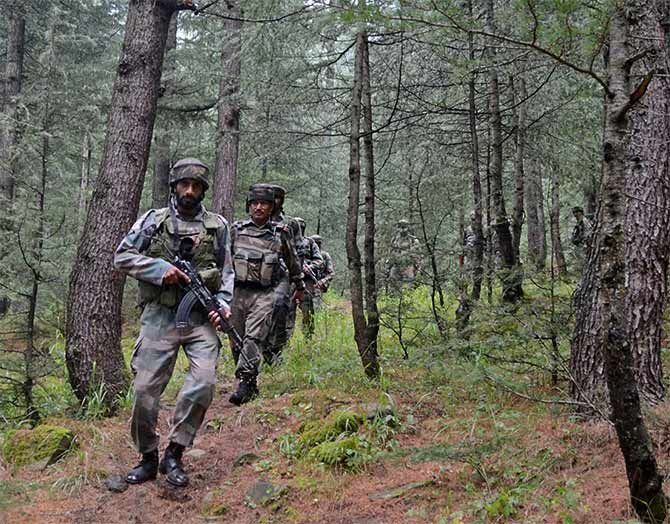
What are the five things you would advise the government to immediately do in the wake of the Uri attack where we lost 18 brave soldiers?
There is no strategic consensus in government today, no clear idea what our objectives and endgames are, beyond broad generalisations of 'peace and development.'
Such simplistic goals are useless in the evolution of strategy, and unless a strategic context is clearly defined, all our initiatives and investments will lack the coherence that is necessary to secure concrete objectives.
Talking about strategy without looking at capacities and capabilities in meaningless. Our strategic options today are crippled by decades of neglect of both the internal security and defence capabilities of the nation, and the current regime has done little to effectively address this crisis.
Indeed, though there are nominal increases in the defence and internal security budget, they are largely eaten away by inflation, and the real investment in these sectors is likely diminishing.
Crucially, moreover, a wide range of critical operational outlays have been squeezed without any attention to the impact on the fighting capabilities on the ground.
The enormous and burgeoning deficits in manpower and technical/technological resources in the defence, security and intelligence sectors, moreover, remain entirely unaddressed.
There is no oppositional dyad between the military and civilian power of a State. These are part of a continuum, and must operate in total synergy to secure the interests and objectives of the state.
But India's structures of governance are totally fragmented and in chronic conflict. Civil-military relations are fractious and the recent conflict over OROP (One Rank One Pension) and current conflict over the 7th Pay Commission’s recommendations and the inequities of status they would reinforce, are cases in point.
Indeed, there is conflict between the IAS-led bureaucracy and every other branch of the executive. No effective strategy against an external enemy is even possible if we are constantly at war with ourselves.
Every prime minister over the past decades has promised an overhaul of the bureaucracy; every one of them has been thwarted.
The Indian State structure is primitive and has no possibilities of responding effectively to contemporary challenges.
Unless this issue is addressed, little sustained forward movement is possible.
The fractious, caste-communal, polarising politics our parties engage in have created an environment that is exploited, and will continue to be exploited, by our enemies.
Unfortunately, none of our political parties -- including, most prominently, the ones whose proclamations of 'nationalism' are the loudest -- are willing to abandon this destructive model.
It is, indeed, India's political leadership that has created our greatest vulnerabilities.



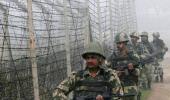







 © 2025
© 2025